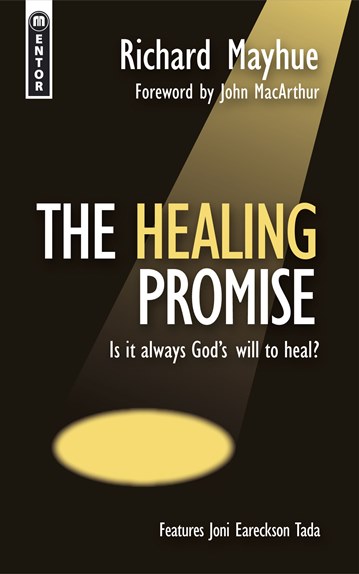The Healing Promise, A Charismatic Response
In this review essay from the Winter 2005 issue, Pastor Graham Old reviews the book The Healing Promise by cessationist Richard Mayhue.
 Richard Mayhue, The Healing Promise: Is it always God’s will to heal? (Christian Focus Publications, 2001), 228 pages.
Richard Mayhue, The Healing Promise: Is it always God’s will to heal? (Christian Focus Publications, 2001), 228 pages.
Richard Mayhue states that his purpose in writing this book is to “develop a biblical model of healing by which we can test anyone who claims to heal—past, present, and future.”1 Thus, I had high hopes for this book. I hoped that we would finally encounter an argument that relied upon a thorough examination of the biblical data and avoided the focus upon testimonies of bad experiences within the fringe element of the Charismatic movement. I hoped that we would find someone genuinely attempting to interact with the finest of Pentecostal and Charismatic scholars, rather than repeating the arguments of a former generation of anti-supernatural cessationists. I was disappointed.
Let us not build an argument on experience—good or bad
The book begins with the usual mockery of the fringe elements in the Charismatic movement. Mayhue is something of a protégé of John MacArthur, so it should not cause too much surprise to find the same methodology employed here that MacArthur resorts to in Charismatic Chaos. What is surprising is the way that Mayhue questions the place of experience in Charismatic theology, while simultaneously using bad experiences as a negative defense of his own position.
Yet, he seems completely unaware of the irony. The book contains a chapter on the bad experiences people have suffered at the hands of healers, a chapter on how healers can create the illusion of healings, a chapter on Joni’s struggle with physical infirmity and what she has learned through it, a chapter on the healing of John MacArthur’s wife, Patricia, and a number of references to the paucity of healing in the post-biblical Church. All of this from an author who would suggest that the problem with Charismatic theology is that it is based on experience!
Mayhue criticises Jack Deere, claiming, “one gets the distinct impression that experience at least equals scripture” in Surprised by the Power of the Spirit.2 This is ironic, because Deere actually makes the point that Charismatics are accused of basing their theology on experience, when what often happens is that cessationists do exactly the same.3 Their lack of an experience of the supernatural—and their consequent perception that such a lack mirrors Church history—is the actual basis for their theology of cessationism. While Deere is ready to admit the place of experience in his theology—which is fully supported by the biblical approach to formulating our doctrine—Mayhue seems painfully unaware of the place that experience is playing in his theology.
Perhaps the lesson here is that we need to carefully assess our theological arguments and be aware of the place that experience plays in that. Pentecostals have often acknowledged the invaluable role of experience in confirming or clarifying theology (more so than Charismatics, who have not always been as honest as Deere in this respect).4 The thing that is to be avoided on all sides is using experience as the foundation of our theology. The degree to which Cessationism has done this is a topic that merits further consideration.
Category: Spirit, Winter 2005


